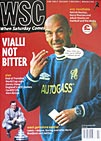 Clubs want more power over UEFA
Clubs want more power over UEFA
At a time when the Olympics, the Champions League and World Cup qualifying matches are all taking place in quick succession, the conflicting demands of clubs and national associations are making headlines once again.
Although it seems unlikely to end in an apocalyptic conflagration, the pressures continue to build to reshape world football on behalf of a small elite of powerful European clubs. Their interest, naturally, is to plug themselves permanently into the cash machine of the Champions League and, if possible, make it flow even more abundantly. The consequences of not doing so are clear for clubs on the fringes of regular involvement such as Chelsea, whose high spending and massive interest burden demand an equally exorbitant income.
To that end, they want (among other things) to restrict the number of international matches played by their increasingly cosmopolitan squads. That means pressurising the players themselves not to join their national teams, as Arsenal did successfully with Kanu and Leeds tried to do with Mark Viduka before the Olympics.
It also means pressurising UEFA to change the rules on player releases and to tinker with the format of the World Cup and European Championship so that smaller countries have to “pre-qualify” for the qualifying groups. Demands that the international calendar be streamlined will intensify as the fragmentation of national associations continues. Greenland, officially part of Denmark, are in the process of applying for UEFA recognition. So too are Catalonia (to be closely followed by the Basque country if they succeed).
The main conduit for the kind of talk is the “G14” group of clubs. (No one knows what the “G” stands for. Greedy?) The G14 has now constituted itself as an “official” body, whatever that means, and is pressing for recognition by UEFA, the European Union and, possibly, the World Bank. “So far UEFA has refused to talk to us officially and that has to change,” said the group’s spokesman Karl-Heinz Rumenigge. “They have to open the door for club football to have its say, especially when it comes to talks about releasing players for international football.”
The G14 is also talking about expanding its membership, possibly to include Arsenal and Chelsea (who, let us remember, only returned to international competition in 1994-95 after an absence of over twenty years). However, there seems to be no talk of dumping some of the group’s less successful members. Which is odd, because even with the absurdly favourable conditions prevailing these days, no fewer than five of the G14 failed to make it to the final group stage of the Champions League this year (Liverpool, Borussia Dortmund, Inter, Ajax and Marseille). Dortmund and Marseille could not even make it into the UEFA Cup, finishing in the bottom half of their leagues.
Yet even within the cabals of the G14, some of the participants seem to be going a bit off-message. Gary Neville is not yet an official spokesman for the group, but his view is that the Champions League should be reduced, with each club playing fewer games. So far, not too controversial – his former chairman Martin Edwards agrees that 13 might be a better number of matches when the next Champions League contracts are negotiated. However, it is hard to imagine any representative from the G14 group agreeing with G Neville that qualification should be restricted to “just the champions of each country and maybe the runners-up”.
“Now that it is getting to the third and fourth team, it’s getting ridiculous,” he said. So ridiculous, of course, that Valencia (fourth in the Spanish league in 1998-99) reached the final of last year’s competition. The ever hopeful Milan, too, would be out of this year’s jamboree if the Neville rule was applied, having finished third in last season’s Serie A.
Although the people who run the G14 might happily reduce the number of teams involved in the lucrative stage of the League, it is of course the likes of Donetsk they want to exclude from it, not the third and fourth placed teams from Spain, Italy, Germany or England.
And if they don’t get their way on these issues, naturally, the G14 are prepared to countenance a breakaway. “As the most successful clubs in football we deserve a bigger voice,” says Rummenigge. Now where have we heard that before?
From WSC 165 November 2000. What was happening this month